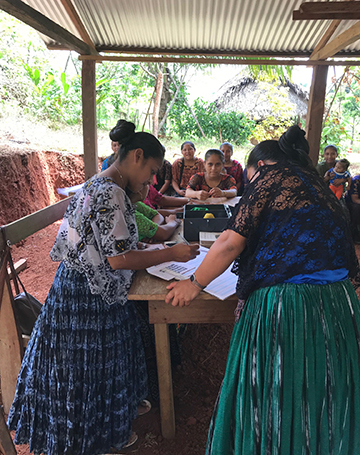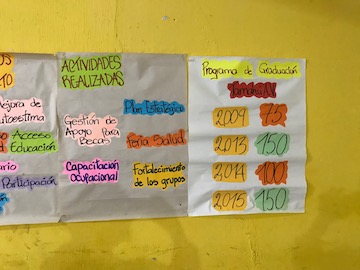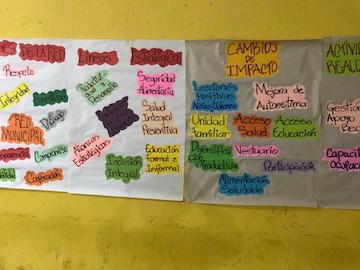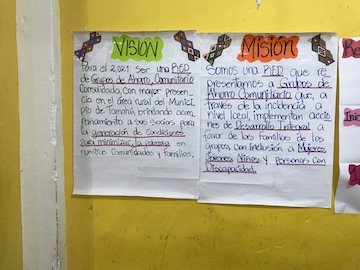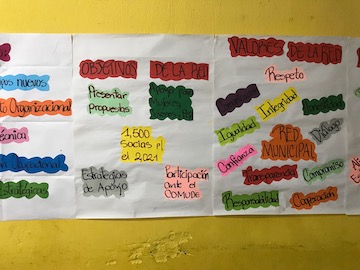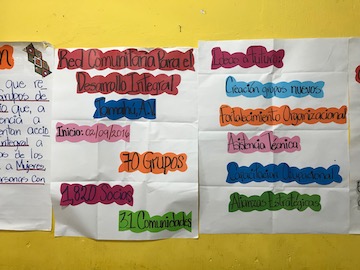Life After Chase: Toni Geyelin
Trickle Up and the Legacy of a Chase Friendship
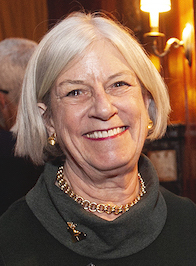 One of the extraordinary things about having worked at Chase is the incredible number of lifetime friendships it has engendered. I know this is true for those of us who were in the International Department, where we often crossed cultural and language divides to forge amazingly strong bonds through shared experiences and the crafting of creative financial solutions to complex credit problems involving prickly growth issues and challenging economic scenarios.
One of the extraordinary things about having worked at Chase is the incredible number of lifetime friendships it has engendered. I know this is true for those of us who were in the International Department, where we often crossed cultural and language divides to forge amazingly strong bonds through shared experiences and the crafting of creative financial solutions to complex credit problems involving prickly growth issues and challenging economic scenarios.
It was one of these tricky financial deals–albeit with someone who grew up in New Jersey versus my New York–that brought me one of my dearest friendships.
 The deal involved an oil trans-shipment pipeline across the Isthmus of Panama. Hammering out the deal took months of negotiations involving Project Finance, the Latin American Credit Division, a Long Island client in the domestic oil and gas business and the Panamanian government. Once you have been through one of these negotiations, you really know what each team member brings to the table and his or her values. This was how my remarkable friendship began with the late Margaret Klein (photo), who became the sister I never had.
The deal involved an oil trans-shipment pipeline across the Isthmus of Panama. Hammering out the deal took months of negotiations involving Project Finance, the Latin American Credit Division, a Long Island client in the domestic oil and gas business and the Panamanian government. Once you have been through one of these negotiations, you really know what each team member brings to the table and his or her values. This was how my remarkable friendship began with the late Margaret Klein (photo), who became the sister I never had.
Both of our experiences dealing internationally tempered our responses to other situations in our professional careers. That is one of the most amazing things Chase gave us, particularly as women of our generation. Margaret was one of the most senior women at Chase in the 1980s, creating opportunities for many women who came after her.
While Margaret and I had met in the credit training program, she was sent off to the Trade Finance Group in London and then on to start up Chase’s operations in South Africa. She then went on to be Deputy Country Manager in Panama which is where our lives crossed again. In the meantime, I had worked in Colombia and then in Mexico, as the first woman to be appointed as a corporate calling officer in Latin America. I subsequently ran Institutional Banking in Mexico, Argentina, Brazil and then the Caribbean liaison desk in NYC, handling the credit requests for the region that included Panama.
I went on to run the Brazil Desk in NYC for two years, during the Brazil Debt Crisis, and then joined the International Private Banking Group, managing a team covering Brazil, Africa and the Middle East. I left Chase from the Real Estate Division in 1989 to join Sotheby's as treasurer.
After Panama, Margaret went on to work with the Shipping and then Steel Divisions before being appointed as head of Global Workout (Special Loan Division). She left the Bank in 1992 and became CEO of Wyatt, a failing fuel oil company based in Connecticut.
Once Margaret had found a buyer for the fuel oil company, her family suggested setting up the Klein Family Foundation, with her as manager. Margaret approached me to be on the Foundation board along with her mother, and so began another chapter in my life after Chase.
The Foundation set as its guidelines giving 10 percent to environmental issues and 30 percent each to education, the arts and community organizations. While most of the donees were U.S.-centric, one of the most compelling, attractive and transformative organizations was a then fairly small one called Trickle Up (TU). Founded by Mildred Robbins Leet and Glen Leet in 1979, the organization is dedicated to advancing the economic and social wellbeing of women living in extreme poverty and vulnerability around the globe.
The Klein Family Foundation, and Margaret in particular, became very active in TU’s management, and she was invited to join its board. When Margaret died of ovarian cancer in 2014, two things happened that were surprising and gratifying to me: 1) The Klein Family Foundation, initially to be dissolved upon Margaret’s death, was left in my care, and 2) TU asked me to finish up her term on the board. I did and have been elected subsequently to serve on the board in my own right.
Margaret had visited TU’s operations in Mali and was so impressed. I was scheduled to make a trip to Burkina Faso in 2018, but political unrest in country resulted in the trip’s cancellation. Finally, in June 2019, I had the privilege of visiting TU’s operations on the ground in three towns in northern Guatemala: Tamahu, Chahal and Coban.
While well versed in the number of lives our programs reach (for every one woman we support, we will bring five people out of extreme poverty), to see the results of TU’s presence in the poorest and most rural reaches of Guatemala was personally transformative. TU makes an amazing difference by giving women a cash grant, teaching them a new and sustainable livelihood, setting them up with a savings group and standing by these women for a period of two to three years to coach and support them. In addition, this program promotes a sense of self-worth, community and empowerment that allows these women, heretofore marginalized, to become active participants in their own communities. They are then able to reach out to other women in their communities and teach what they have learned. The multiplier effect is staggeringly meaningful, heartwarming and lifechanging.
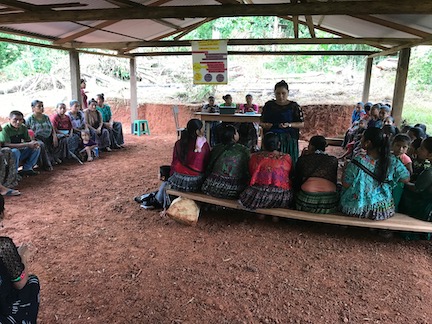 Our field personnel work with local civic volunteers, trainers and program participants in a totally dedicated and seamless fashion that engenders trust, faith and mutuality of purpose so that these women’s lives are truly transformed.
Our field personnel work with local civic volunteers, trainers and program participants in a totally dedicated and seamless fashion that engenders trust, faith and mutuality of purpose so that these women’s lives are truly transformed.
I had the opportunity to sit next to the outgoing Mayor of Chahal while in Guatemala, an unexpected champion of TU’s work. As a successful local businessman in his own right, he did not believe the program could work. He is now a convert and has program graduates working in the civic offices in Chahal. Truly a vote of confidence coming from an important local stakeholder! He has found these women to be hardworking, dedicated and creative members of the workforce.
Margaret might not recognize TU today, but she would be so proud of its work and the role she played in its earlier days, as well as the support her family foundation still gives it.
In 2018, TU served 160,127 people in 19 countries–more than twice the number it reached in 2017 and 13 times the level of just three years earlier. We began a major new program in Uganda and expanded our global partnerships with high-impact institutions, including UNHCR/The UN Refugee Agency, the World Bank, India’s National Rural Livelihoods Mission, the U.S. State Department and the U.S. Agency for International Development. We continued to innovate with new program methods and, courtesy of a grant from Tata Industries, customized smartphone apps and phones that we put into the hands of our participants to permit them to take advantage of the computing and communication power of the Internet.
Our operating income for fiscal year 2018 was $6.7 million, a 42 percent increase from 2017 and way above what it was in Margaret’s day.
Two years ago, Nicholas Kristof, in his Christmas op-ed in The New York Times, recommended TU as a year-end gift opportunity. He visited our operations in Paraguay and Guatemala this year again and, with his wife Sheryl WuDunn, has been very supportive of TU’s work.
Let me end by saying Chase friendships are strong and long-lasting. I am so grateful my particular friendship with Margaret led me down this road and to this chapter of my life after Chase.
– Toni Geyelin
Photos from Guatemala
